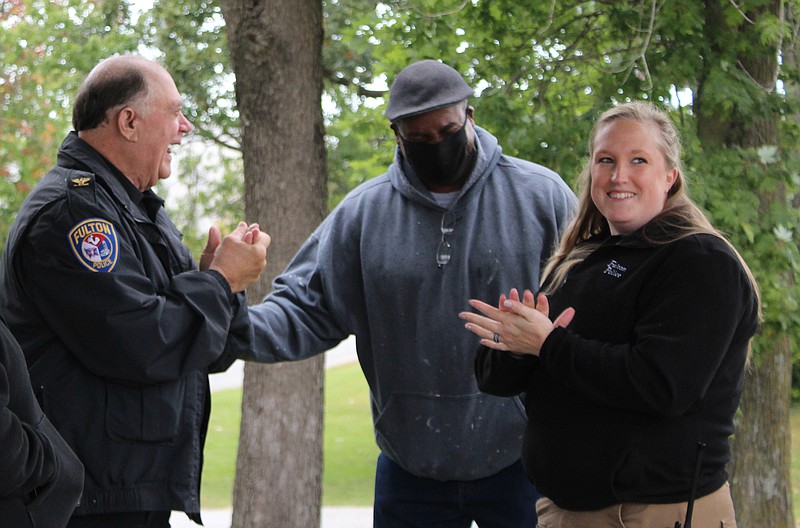When mental health issues are left untreated, a crisis can become a pattern and an individual in need of help can become a familiar face to law enforcement.
The goal of crisis intervention training for law enforcement is to keep that from happening. The Callaway County CIT Council works prevent reoccurring, unnecessary contact with law enforcement, Fulton Police Department Detective Sgt. Crystal Kent said.
In 2015, Kent attended a training by Laura Heitmann, of Arthur Center Community Health.
"During the training, it opened my eyes to what a crisis was and why someone in crisis would have contact with law enforcement or a first responder before they even knew they were in crisis," Kent said.
Kent was inspired and became involved with the Missouri CIT Council.
Soon, Heitmann and Kent began work on establishing a local council.
"I attended a couple meetings and Laura and I decided the community in Callaway County could benefit if we took the time to educate the local first responders, gather resources and work on issues faced daily," Kent said.
Kent serves as the Missouri CIT Council training coordinator and as a member of the state council working committee and annual CIT conference committee. State CIT coordinator Jason Klaus said Kent has a heart for doing her job with a crisis intervention focus.
Crisis intervention training helps first responders understand what a mental health crisis looks like, focusing on de-escalating and empathy.
"I think what really opened my eyes was from being a deputy and a detective," Klaus said. "A lot of the cases I was seeing had undiagnosed mental health issues."
Klaus saw people self-medicating, turning to drugs and alcohol.
"We see a lot of the same people over and over again, in and out of jails," Klaus said.
When the default response is to send someone to jail or an emergency room, the root problem isn't addressed and people don't receive the help they need.
"Even if you have a mental illness or a substance abuse issue, you have to be accountable for your actions, but you can get help," Klaus said.
With the right training and resources, law enforcement can refer individuals to local organizations that provide support.
Crisis intervention can also teach officers to develop verbal responses instead of defaulting to use of force.
"The training provided is not me or any of the instructors telling the first responders what they have been taught previously is wrong or the way they've handled a situation before is wrong, but it provides another tool and more resources for every situation," Kent said.
Law enforcement are often the default responders to a wide variety of community issues.
"It is put upon us to respond to so many different crisises," Klaus said. "It's difficult to be trained in all of the things we are asked to do."
Over the spring and summer, nationwide protests focused on racial justice and police accountability. Several peaceful protests took place in Callaway County. As part of the conversation, some called for reducing the role of law enforcement in mental health crises.
"I personally feel this (CIT) is important because, as many people will tell you, we, as first responders, should not be dealing with mental health calls, but we are," Kent said. "I want all the first responders and community members to be educated and to know what resources we have in Callaway County and how we can help someone who is crisis."
According to a 2019 study in the Journal of the American Academy of Psychiatry and Law, there isn't evidence that police crisis intervention teams have reduced the lethality of police encounters. But CIT has shown some positive impacts, including diversions from jails to psychiatric services.
"I'm not saying these things will completely go away, but we are trying to train officers to respond the right way," Klaus said.
The Callaway County CIT Council was established in 2017. Kent and Callaway County Sheriff's Office investigator Ryan Stiffler are co-chairs.
The Holts Summit Police Department, FPD, CCSO, Arthur Community Health, AFSP, Callaway County Children's Division, Callaway County Special Services, Callaway County Circuit Clerk's Office, Callaway County Ambulance District, CARDV, Comprehensive Health, Deaf LEAD, Fink Supported Living, Fulton Medical Center, MUPC, New Vision, Our House, SSM Health, Westminster College, William Woods University and probation and parole participate.
The group meets monthly to discuss ways to improve the community. It provides the 40-hour basic CIT training, as well advanced training in youth crisis intervention.
In 2014, only 15 predominantly urban Missouri counties had established CIT councils. As of this month, 77 Missouri counties are covered by an established council. Other counties are expanding CIT, leaving only 10 without a council or expansion efforts.
"We want chiefs and sheriffs to feel like this is a missing part in their community," Klaus said.
In Callaway County, the council discusses resources and incidents.
"We are always on the look out for new resources, ways to help in the community and expand our knowledge so we can share it with others," Kent said. "This is also a place where we can build bridges between agencies to make the process of working together a much smoother one."

